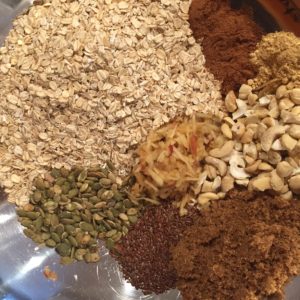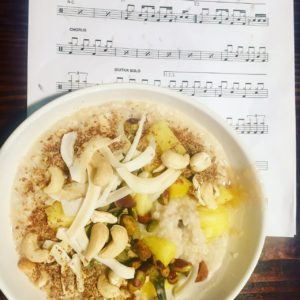This year, we are truly celebrating Lent in our home for the first time since we’ve had children- ashes on Wednesday, fish on Friday and a rice bowl to fill with alms for the poor. So it didn’t totally surprise me when I found my meditation pulling me into a posture of soul searching curiosity. What is it all really about? Recently, Pope Francis asked Catholic Christians around the world to reconsider the heart of fasting and penance this Lenten season. I agree with him that in recent years Lent has become externally focused. Almost like a practice of sacrifice for show. According to Pope Francis, fasting must never become superficial.
From the seat of a nutritionist, fasting is a sensitive subject. Particularly when you assign emotional attributes to the practice. Whole food from the Earth leads to health and wellness. Planning vegetarian meals or days of moderate intake are wonderful practices so long as we avoid the tendency to assign a barometer of worthiness to our ability to stay on or off the fast. In my opinion, emotional eating for any reason is a slippery slope.
So, why do we send six weeks of preparation focusing on denying ourselves something we really love? Is charity still noble if it doesn’t hurt the me or cost a penny? What is the true exchange that God requires of us? I am so drawn to the words of Isaiah, “Is it such a fast that I have chosen? A day for a man to afflict his soul? Is it to bow down his head as a bulrush, and to spread sackcloth and ashes under him? Will you call this a fast, and an acceptable day to the Lord? Is not this the fast that I have chosen? To loose the bands of wickedness, to undo the heavy burdens, and to let the oppressed go free, and that you break every yoke? Is it not to deal your bread to the hungry, and that you bring the poor that are cast out to your house? When you see the naked, that you cover him; and that you hide not yourself from your own flesh?” (Isa. 58:5-7). I find myself believing that God’s people humble themselves through fasting in order to draw closer to Him—so that they can learn to think and act like Him—so that they can live His way of life in all things. That is why fasting is a common practice in several spiritual and religious doctrines
In my yoga teacher training days (Has that really been over a decade ago?), we spent a great deal of time on philosophy and cardinal virtues of the eight limbed yoga system including ahimsa (non harm) and seva (selfless service). The vedic teachings on giving made a lasting mark on my heart. We serve to make others lives better. Not to make our own lives tougher. God loves us and doesn’t intend our suffering or our separation for the source of all joy. “Living creatures are nourished by food, and food is nourished by rain; rain itself is the water of life, which comes from selfless worship and service.” – Bhagavad Gita, 3.14
A perfect meal for Lent.
1 cup red lentils
6 cups clean water
4 T olive oil or ghee or both
1 – 2 tomatoes (ripe)
Veggies (chopped small) such as fresh spinish, carrots, leeks, zucchini, or kale
1 inch piece fresh grated ginger
2 dashes hing (optional)
1/2 tsp cumin seed
1/2 tsp coriander seeds (optional)
1 T cumin powder
1/2 tsp Turmeric powder
1/2 tsp cayenne powder
1/2 lemon
Handful chopped cilantro
Sea salt to taste
Begin by rinsing the legumes until water is clear. Boil the legumes with water separately for 45 min. Add turmeric and a tablespoon of ghee or oil. In a smaller saucepan heat ghee or oil, add whole seeds and a dash of hing (it should fizz). When cumin seeds begin to brown add ginger, powdered spices, curry leaves and black pepper. Roast spices for 1 minute then add veggies. Stir veggies with spices, cook on high for 3 min. Add salt. Turn to medium heat, cover and simmer until veggies are just tender. Add water only to keep veggies from burning. Whip legumes with a whisk, then add veggies. Bring to boil, turn off, add lemon, cilantro and more salt to taste.
There’s a great quote by an early Christian mystic John Chrysostom “No act of virtue can be great if it is not followed by advantage for others. So, no matter how much time you spend fasting, no matter how much you sleep on a hard floor and eat ashes and sigh continually, if you do no good to others, you do nothing great.”
A few ideas for my 2015 Seva Lent.
Read a Bible verse each night with my family. Spend 15-20 minutes reading and talk about how they feel, what they are experiencing and what it means to them.
Start a prayer rhythm. Say a prayer every time you brush your teeth, hear an ambulance, or check your e-mail. Before you text someone, pray for them.
Read one chapter in the holy book each day. (Matthew’s a good book to start with. Psalms, too.)
Forgive someone who doesn’t deserve it (maybe even yourself.)
Give up negative self talk. Replace it with a mantra like “God IS Love.” or “Be Still and Know God.”
Create a daily quiet time. Spend 30 minutes a day in silence and prayer.
Cultivate a life of gratitude. Write someone a thank you letter each week and be aware of how many people have helped you along the way.
Be kind to someone each day.
Pray for others you see as you walk to and from classes or drive to and from work.
Volunteer one hour or more each week





